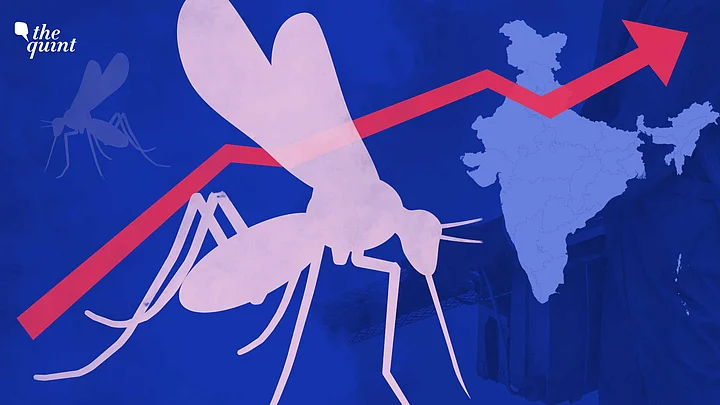With monsoons slowly subsiding in India, dengue cases have yet again gone up. So much so that over 1,238 cases were reported in Delhi in October so far — This is the highest number of dengue cases recorded in the month of October in the last five years.
The total tally of dengue cases in the national capital this year has gone up to over 2,000.
Delhi Deputy Chief Minister Manish Sisodia on Tuesday, 11 October, ordered all Delhi hospitals to “reserve 10-15 percent beds for patients of vector-borne diseases,” FIT had earlier reported.
But should you care or be concerned that cases are rising again? Can you take preventive measures? Is there a cure? FIT decodes it for you.
How is dengue caused?
Dengue fever is caused by the bite of an infected Aedes aegypti mosquito. Getting bitten by an Aedes albopictus mosquito can also cause dengue. There are four types of dengue viruses (DENV) that can be caused through mosquito bites.
DENV-1 and DENV-2 are prominent in India
DENV-2 and DENV-4 cause severe dengue fever
What are the symptoms of dengue?
The symptoms of dengue, which usually last for 2-7 days and appear approximately 4-7 after the mosquito bite, are:
High fever
Severe headache
Joint and muscle pains
Pain in the belly, behind the eyes, in your bones
Vomiting (multiple times a day)
Nausea
Mild bleeding (from the nose and gums, while vomiting, or in the stool)
Rashes
Fatigue and restlessness
How is dengue diagnosed?
Dengue can be diagnosed using two tests:
NS-1 Ag: Detects the virus up to six days after the onset of the infection
Dengue serology: Detects the virus five days after the onset of illness
How is dengue treated?
Since there is no specific treatment or vaccine for dengue yet, the treatment usually involves:
Staying hydrated, drinking plenty of fluids
Seeking medical consultation and prescription for painkillers
Get ample rest
If there's no "cure," are there at least preventive methods to avoid getting infected with dengue?
While there is no cure for dengue, there are certain things you can do for prevention:
Prevent mosquito breeding by disposing waste properly, removing artificial water habitats, removing stagnant water from mugs and potted plants, covering/cleaning water containers, and screening any vector hotspots near you
Use repellants, mosquito nets, coils, etc
Wear full-sleeved clothes
Spread awareness on control and safety measures
Avoiding tropical places during monsoon
Are there any risks that come with dengue? Is it contagious?
While dengue is not contagious, it can spread from mosquito bites from a person suffering from the virus to a healthy person. It can also pass on from a pregnant person to an unborn child.
Additionally, while recovering from dengue gives the patient life-long immunity against that specific virus, a re-infection can result in severe dengue.
What is severe dengue?
Dengue can be asymptomatic or have symptoms that include high fever, severe headache, muscle pain, joint pain, nausea, vomiting, swollen glands, rashes, etc.
Severe dengue is when the patient has been suffering from the virus for approximately 3-7 days and their symptoms start becoming critical. These may include severe abdominal pain, continuous vomiting (which might include blood), fast breathing, bleeding gums, fatigue, restlessness, etc.
(At The Quint, we question everything. Play an active role in shaping our journalism by becoming a member today.)
